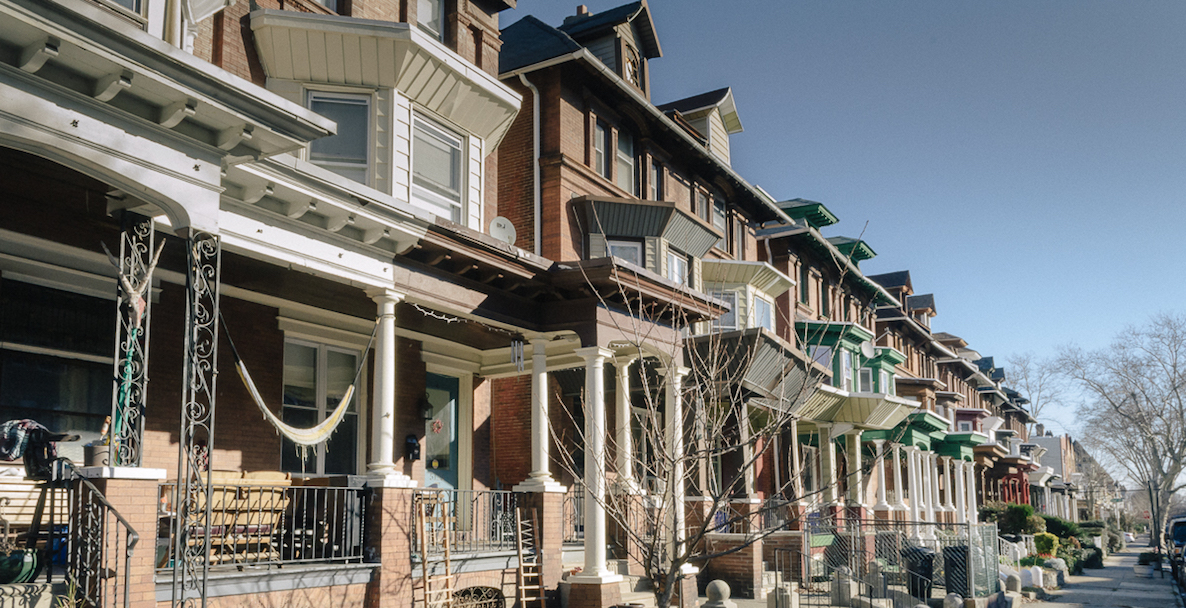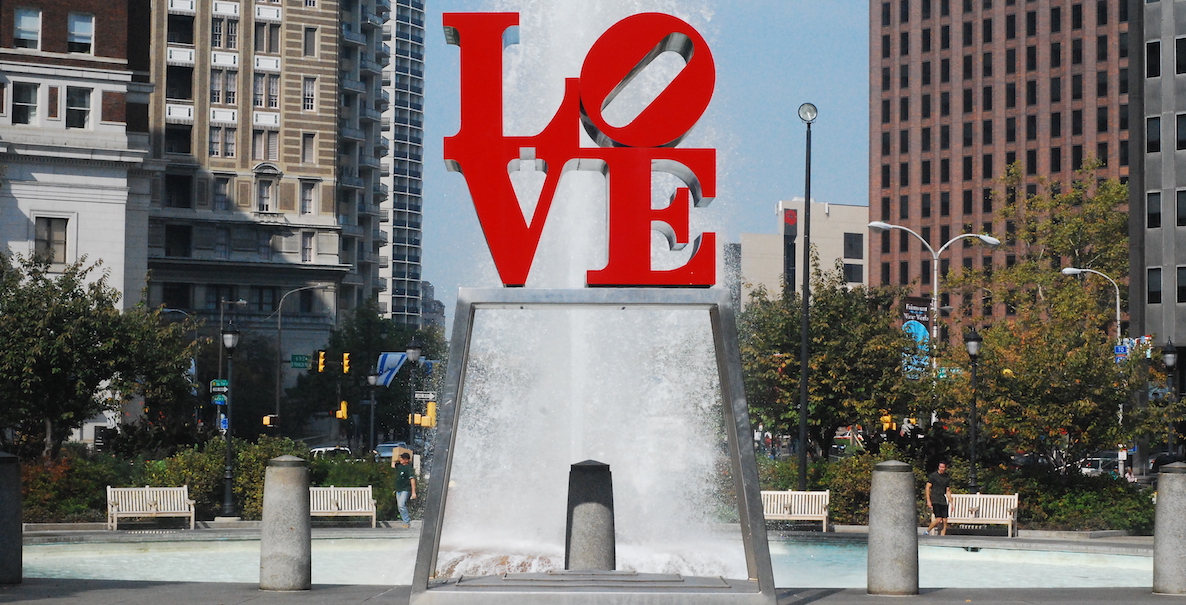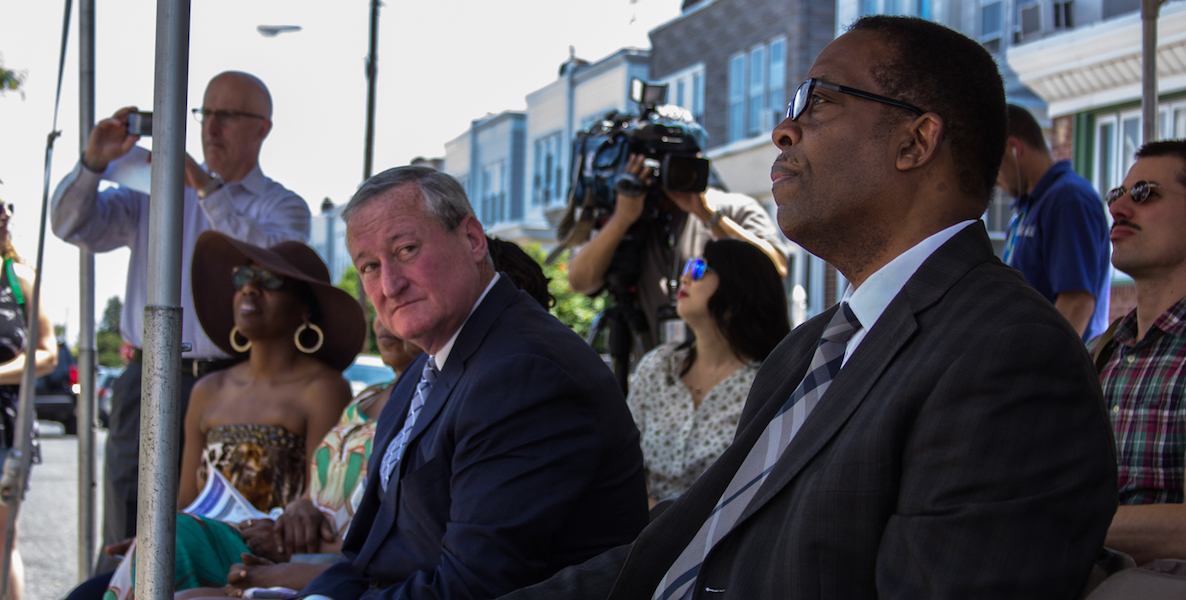Last week, the latest Census reports confirmed that, despite all the good stuff happening in Center City and its close-in neighborhoods—the kumbaya feeling of the Amazon bid, our vibrant downtown streets, an explosion of millennials and artists and immigrants—Philadelphia under Jim Kenney just may be falling further behind.
Turns out that, while poverty has fallen and income has increased nationwide, Philly bucks that trend. We’re the only big city that hasn’t seen a drop in the poverty rate—we still lead the league at a staggering 26 percent—and, perhaps most disconcerting, we’re the only one that has seen a drop in median household income.

Prefer the audio version of this story? Listen to this article on CitizenCast below:

When he ran for Mayor, Jim Kenney rightly called our poverty rate “shameful.” But he hasn’t done the hard work of rethinking our approach to the problem. In fact, sadly, he’s a defender of the same old policies that have gotten us where we are.
The Inquirer zeroed in on the city’s anti-poverty office, the Office of Community Empowerment and Opportunity. (Office of CEO, get it?) Reporters Claudia Vargas and TyLisa Johnson detailed how the office has spent $65 million with hardly any results to show for it, save Executive Director Mitch Little’s $130,000 salary, the $95,000 for his assistant and scheduler, and the $160,000 for his speechwriter and executive coach. Some of this stuff is hard to make up.

Of course, the buck doesn’t stop with some dude named Mitch Little. If we want to figure out how to move the needle on something as daunting as poverty, we need to get past the usual tropes. Embedded in Vargas and Johnson’s story are two quotes that, taken together, just might point to why we’re in the shapewe’re in.
The first is the obligatory sound bite from a political critic of the administration. In functional cities, that would come from someone representing an opposing political party. Here, in the People’s Republic of Philadelphia, it comes from someone from the previous democratic mayoral administration. “Right now, we have 26 percent poverty rate and no direction. From anyone,” said Otis Bullock, Jr., who served as head of essentially the same agency as CEO under Mayor Nutter—when the poverty rate rose to roughly its current level. Bullock calls for a cabinet-level position to oversee all city anti-poverty strategy.
![]()
While that would no doubt help to send a strong signal that fighting poverty is a top priority of the city’s chief executive, there’s an assumption underlying Bullock’s prescription—and the way we think about confronting poverty generally—that ought to be held up to inspection: Maybe the answer isn’t to be found in the glacial pace and intellectual wasteland of government. After all, some 50 years ago, when President Lyndon Johnson announced the war on poverty, the poverty rate was 19 percent. Today, some $6 trillion later, it’s 16 percent. Maybe we need a new way to think about approaching the problem?
But that would require conceding that we have a problem, which the mayor—Trump-like—seemed loathe to do last week. Through his spokeswoman Deanna Gamble, Kenney told The Inquirer that the city’s anti-poverty agenda is “comprehensive” and housed among various departments. “Looking at just the funding for one city department is insufficient to gain an understanding of the city’s efforts,” she said.
That response having landed with a reverberating thud, the Mayor took another shot this week, penning an Inquirer op-ed. Unfortunately, it’s little more than a doubling down on failed policies and an endorsement of the idea that governmental programs are the answer. It’s also a defensive recitation of incremental efforts in the face of a huge crisis. He spends two paragraphs lauding the Philadelphia Beverage Tax—a tax, not a policy—and references a workforce development strategy, “Fueling Philadelphia’s Talent Engine,” the steering committee of which includes a notable lack of private sector employers. He lauds the fact that 600 families have moved into city-financed affordable homes and that 300 more homes are under construction. Not only is there not a new idea proffered—there is mere lip service paid to growing the economy and creating jobs.
Jim Kenney is up for reelection next year, and the smart political move would be to rethink his denial and run on the grand, bold idea of reversing poverty. That would require issuing a call to all of us to figure it out…together.
Where is the urgency? We’re in last place, guys—our economic growth rate ranks 23rd of the nation’s top 25 cities—and our Mayor proclaims that “systemic, intergenerational poverty has been a scourge on Philadelphia for as long as I can remember…We must be mindful however, that there is no single solution, and that results of our work may take years, even decades to fully materialize.”
Kenney’s way too long-term argument is that improvements in education hold the key to lessening poverty. That’s a widely held view, but it is, of course, too simplistic. “Nobody doubts that a better-educated workforce is more likely to enjoy higher earnings,” writes economist Jared Bernstein, Chief Economist to Vice President Biden during the Obama administration. “But education by itself is a necessary insufficient antipoverty tool. Yes, poor people absolutely need more education and skill training, but they also need an economic context wherein they can realize the economic returns from their improved human capital.”
That is to say: Educated citizens without competitive markets that provide opportunity are simply better educated poor people. (For proof, look no further than Cuba, where cab drivers have graduate degrees). We’re in year three of the Kenney administration and we’ve heard a lot about taxing soda and community schools, but still have yet to see an economic growth agenda.
So, instead of reacting defensively and in denial of the latest poverty statistics, how could Jim Kenney have met the moment as a leader? In my fantasy, he wouldn’t send a spokeswoman out to respond to Census data that has his city alone on a no-growth, impoverished island, and he wouldn’t write an op-ed that lists a bunch of small-ball actions. He’d face the music himself and inspire us with a willingness to think big and anew.
![]()
“What we’ve been doing hasn’t worked,” he’d say. “It is unacceptable that we lead the nation in poverty, in deep poverty, and in children in poverty, and that we have anemic economic growth compared to other cities. That’s why I’m convening the best and the brightest thinkers from academia, the private sector, the nonprofit cohort, and government to rethink what we’re doing and how we’re doing it. It’s time for a Marshall Plan on poverty in the city where American Democracy was created.”
Wouldn’t that have been cool and inspiring? It would have been in keeping with the “horizontal leadership” Bruce Katz and the late Jeremy Nowak write about in The New Localism, a road map for how cities turn around. They document how political leaders in cities like Pittsburgh, Indianapolis and Copenhagen brought groundbreaking change by being conveners—not top-down prescribers—and by putting ego aside and being willing to let others take credit. What if Jim Kenney called a “Solutions Summit,” in which he gathered the presidents of our universities and their smartest minds, foundation leaders, business machers, and everyday citizens to whiteboard a new way to think about the shameful fact that more than a quarter of our fellow citizens can’t make ends meet?
There are case studies out there worth studying. As I’ve written before, under former Mayor Michael Bloomberg, New York City’s 4 percent drop in the poverty rate between 2006 and 2013 made it the only city of the nation’s top 20 to show a decrease. How’d they do it?
An eye-opening, four-part series from the American Enterprise Institute chronicles just how much the New York approach challenged the kind of conventional wisdom Kenney accepts and regurgitates. Bloomberg didn’t approach the problem by simply seeking to expand the safety net. He created a data-driven culture of experimentation, and went around governmental bureaucrats to drive it, tapping Geoffrey Canada, founding director of the Harlem Children’s Zone, and Dick Parsons, then-CEO of Time Warner, to lead the city’s newly created poverty-fighting entity, the Commission for Economic Opportunity. (Yes, another CEO).
They collected data from all five boroughs and started experimenting. Some attempts, like Family Rewards, a program that paid parents for acts of positive parenting, failed. Others, like Paycheck Plus—a tax credit program that expands Earned Income Tax Credit benefits to low-income single working adults—put an average of $1,400 in the pockets of low-wage workers.
Perhaps most germane to the challenges facing us in Philadelphia, the Bloomberg administration’s approach was a true public/private partnership, with the private sector ponying up $100 million to support innovative measures designed to help poor people achieve economic success. Look at page 34 of Philly’s Shared Prosperity plan for its Board of Directors and you tell me: Where are the business leaders who can get us beyond the same-old, same-old and weigh in on how to fight poverty by actually growing jobs?
![]()
One of the problems with how we’ve targeted poverty through the years is we’ve focused on the impoverished. Now that we’ve seen what turned out to be the significant limits of the War on Poverty, it’s clear that programs available to all of us—and not just the poor—actually have done more to lift our citizens out of poverty than direct cash assistance to those in it. The economy-expanding effects of Social Security, Medicare, the G.I. Bill of Rights, and, yes, Obamacare are not only philosophically communitarian—that is, they say to citizens, in effect, “We’re all in this together”—they’ve long been poverty reducers. What are the local analogs to these national policies?
To be clear, this isn’t an argument for shredding the safety net, but it is a call to think bigger than the safety net. And that will require getting into the tricky terrain of culture—a place few want to go, because conservatives can sound like they’re denying systemic racism and liberals like they’re just driven by bleeding hearts. It’s time to end talking past one another—which is often done purposefully, for political ends.
What if Jim Kenney called a “Solutions Summit,” in which he gathered the presidents of our universities and their smartest minds, foundation leaders, business machers, and everyday citizens to whiteboard a new way to think about the shameful fact that more than a quarter of our fellow citizens can’t make ends meet?
“Racism can condition legacies, under which behaviors persist even when what originally caused them has receded or even disappeared,” Columbia University Professor John McWhorter, an African-American conservative, wrote on Vox.com, in an essay headlined “Why The War On Poverty Failed—And What To Do Now.” “One speaks the language one grows up hearing, and culture is not different in this regard, walking in lockstep with neither the GNP nor social tensions. This is hardly cause for dismissal of the problems in question; however, it means that changing conditions is often only part of the battle.”
McWhorter bears out his thesis by citing a case of our very own, the Belmont 112. Remember them? Back in 1987, philanthropist George Weiss “adopted” 112 sixth graders at West Philadelphia’s Belmont Elementary School, guaranteeing them a fully-funded education through college provided they didn’t use drugs, have children out of wedlock, or commit crimes.
Weiss provided tutors, after-school programs, and counselors. Yet the program yielded as many felons as four-year college graduates (20 each); 45 of them didn’t graduate high school; and more than half of the girls had babies before turning 18. “Obviously, for reasons hardly their fault, the only cultural norms these kids had known affected them profoundly, even with external conditions crafted to nudge them in another direction,” writes McWhorter.
This isn’t to say there’s a poverty gene or to blame those in poverty for their plight. But when the data overwhelmingly shows that, for example, half of all children living in poverty reside in homes headed by single mothers, policymakers have to address it—which is why, early on, Bloomberg said, “Fathers are missing from our strategy to drive down the poverty rate,” and constructed policies designed to bolster the work rate of low-skilled men and to hold them accountable for child support.
When he ran for Mayor, Jim Kenney rightly called our poverty rate “shameful.” But he hasn’t done the hard work of rethinking our approach to the problem. In fact, sadly, he’s a defender of the same old policies that have gotten us where we are.
Ideas such as these don’t appear in the Philadelphia approach, and nor does any larger, aspirational vision. Jim Kenney has called our poverty rate “shameful,” yet defends the strategies that are failing to reverse it. I’ve seen Kenney’s passion for school children when he visits our schools, and it seems genuine. But good intentions are not enough.
Our political system is allergic to new ideas—even when the old ones have clearly failed. Jim Kenney is up for reelection next year, and the smart political move would be to rethink his denial and run on the grand, bold idea of reversing poverty. That would require issuing a call to all of us to figure it out…together. Issuing such a challenge—with specific goals and timetables—would give us all a common project to rally around.
It would require channeling the spirit of FDR who, when he launched the New Deal, said “Do something. If it works, do more of it. If it doesn’t, do something else,” and of Ronald Reagan, who would quote Einstein: “Imagination is more important than knowledge.” Does Jim Kenney have such elasticity in his imagination? We haven’t seen it. But how cool would it be if he surprised us?
Photo: Philadelphia City Council via Flickr









